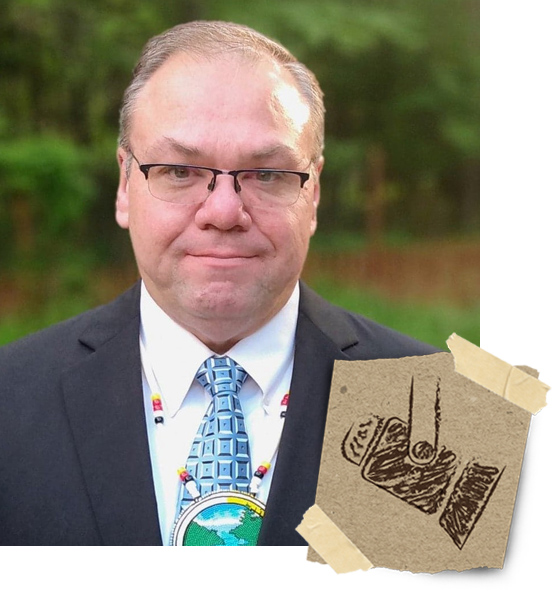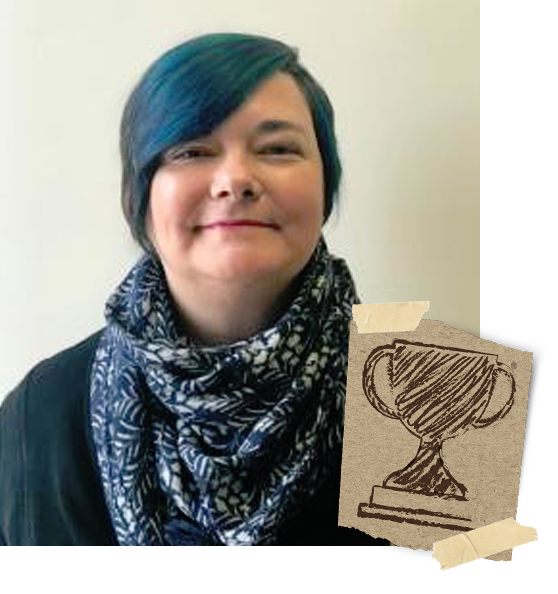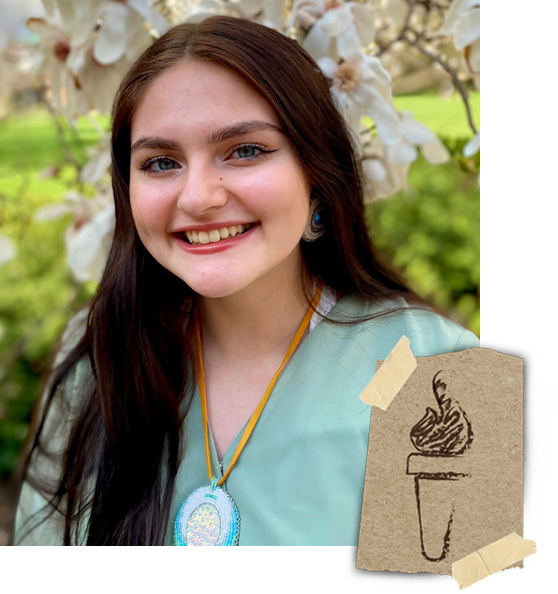Diversity Spotlight: Jason Cross
November 15, 2021 - Tony Beyers, Liz Schondelmayer
 Jason Cross graduated from the MSU School of Social Work in 2015 after earning both his Bachelor's and Master's degree from Michigan State University. Since then, he has worked tirelessly to ensure that children in tribal nations and indigenous communities are given the resources and support they need to lead physically, mentally and spiritually healthy lives.
Jason Cross graduated from the MSU School of Social Work in 2015 after earning both his Bachelor's and Master's degree from Michigan State University. Since then, he has worked tirelessly to ensure that children in tribal nations and indigenous communities are given the resources and support they need to lead physically, mentally and spiritually healthy lives.
Below, Jason discusses his current position, the experiences he had at MSU that helped him prepare for this position, and ways that each of us can be a better ally to indigenous peoples during Native American Heritage Month and beyond.
Congratulations on being appointed State Manager of ICWA Compliance and Race Equity at MDHHS Children’s Services. What led you to want to pursue this position?
I have spent the last seven years of my life working for the Little River Band of Ottawa Indians (LRBOI) as the Director of Family Services and Behavioral Health serving tribal children and their families. Children are critical to tribal nations as they represent the future of the tribe and its seven generations philosophy. I felt that it was important at this stage of my career to not only continue to advocate for children from my own tribal nation, but also broaden the reach of that work to include all tribal children and all children of color, and their families in the state. I felt the time was right to make the move to employment with the Michigan Department of Health and Human Services (MDHHS) Children’s Services Agency (CSA) because of the recent increased commitment to indigenous and race equity issues by former Director Chang and current Director Starling. The environment created by those two leaders allows me the freedom to creatively support historically marginalized segments of the population in the area of child welfare.
What are some of the goals and objectives you hope to accomplish in this position?
I have two overarching goals in my current position that drive my daily work. The first is to ensure MDHHS compliance with the Indian Child Welfare Act (ICWA) and the Michigan Indian Family Preservation Act (MIFPA). While this goal may appear basic on its surface, it is important to remember that there are 574 tribal nations in the United States and 12 right here in Michigan. Each one of those tribal governments has the sovereign right to determine care for their children. There are also 83 counties in Michigan. Each with its own court system and MDHHS staff. Every law and policy created related to child welfare has an impact on indigenous children and families. Collaborating and communicating with Michigan’s federally recognized tribes as well as state and federal officials on topics such as policy, legislation, contracts, and programming keeps the compliance goal in the forefront of everyone’s minds. The second overarching goal is to address the overrepresentation of children of color in the child welfare system. This problem is well documented, but not as widely known or understood as it should be. The reasons for the disproportionality can range from antiquated or poorly written policy to mandated reporter bias. Reviewing policy, revising training, and providing guidance alongside a diverse team is the path to addressing the problem. I believe that building and fostering relationships is the best way to further all goals and it is my priority to listen and appreciate everyone’s position and responsibilities related to the needs of children of color. It has always been my policy to be open and available to community members, employees, partners, and anyone else who has a question or something to share and I am committed to continuing that in my new position.
This interview will be seen by a lot of social workers, especially those living in Michigan. What do you think are some things that they need to know about Indian Child Welfare, culturally sensitive social work practices, and how to support your work?
I present many trainings as a part of my position and one thing I always stress is that it is important to get to know the Tribal government or indigenous person you are working with. There are 574 federally recognized tribes in the United States. They are all different in many ways. There is an instinct to group all indigenous people into one group which originates with the term Indian. The first time we were called Indian, we lost some of our individuality and identity. We are Ottawa, Chippewa, Potawatomi, and hundreds of others across this land. There is also a tendency to believe that all indigenous people are the same in terms of their connection to culture. Because of the history of boarding schools and other government-sponsored attempts to destroy indigenous culture and language, indigenous people vary in their knowledge when it comes to culture. Studies have shown that culture grounds individuals and I have always supported and promoted connecting children and families with their culture regardless of race, ethnicity, or political status. I also strongly suggest becoming educated regarding the boarding school era in the United States. We continue to observe the discoveries of unmarked graves of children who attended Indian boarding schools in Canada (6,509 and counting) and anticipate similar discoveries in the United States. The boarding school era is the root cause of a multitude of social challenges plaguing indigenous communities including child abuse, substance use, and mental illness.
You have a BASW and MSW with a concentration in Organization and Community Leadership from Michigan State University. How do you feel that has helped you in your professional career and led you to this position?
I have worked with and supervised many clinical social workers who do an amazing job providing direct services to children and families, but that is not where my passion lies. I am thankful that MSU offers the organizational and community development track in their MSW program. I enjoy social work at a macro level, especially program and policy development. One of the things I say often is that practice should drive policy. Frontline workers need to have the structure and supports in place that enable them to do the important work they do every day. I enjoy listening to frontline staff and their clients describe what they need to succeed and then be able to go and help create programs and policies that support that work. The specific knowledge I received in the program enabled me to be successful while I was directing several departments for the LRBOI and continues to help me in my current role.
In honor of Native American Heritage Month, what are some things that you wish more Americans understood about Native American heritage? Additionally, what are some common misconceptions people have about Native American heritage or history that you would like to clear up?
The most important thing to understand and remember is that we are still here. Believe it or not, there are many people who think Native Americans no longer exist. There are millions of people who identify as Native American. The exact number is difficult to quantify because of how that number is defined. The fact that we are still here is a testament to the resiliency of indigenous people. Indigenous people look very different. We have long and short hair, different colored eyes, and varied skin color. Not everyone is going to fit into the stereotypical cultural box of a native person. There are currently 574 federally recognized tribes in the United States and many more seeking recognition. Each one of these tribes is different in many ways. I think considering all Native Americans as a whole instead of recognizing and celebrating the differences between the individual tribes is the greatest mistake most people make.
How can each of us be better allies to Native American communities, not just doing this heritage month but all year round?
I would hope everyone can take some time and dig deeper into the issues that affect Native Americans. Considering how busy most people are today, they tend to hear a news story or read an article and move on only having learned the bare minimum about the topic. I would like to challenge everyone to choose a topic and learn all they can about a subject. Boarding schools, missing and murdered indigenous women, health disparities, land rights, ICWA challenges, and poverty are just a few of the current issues facing Native people today. There is so much to learn about each of these. In addition to educating yourself on these subjects, I would ask that you become an advocate for Native Americans by speaking up when misinformation is being spread. Having difficult conversations with those around you is not easy, but it is necessary to dispel myth and urban legend.
Read more:

Diversity Champion
Faculty/Staff
Dr. Heather Howard
Dr. Heather Howard, an MSU Anthropology associate professor has dedicated her career to promoting our understanding of Native American heritage, through community engaged research.

Diversity Torch
Student
Roxy Mashkawiziikwe Sprowl
Roxy Mashkawiziikwe Sprowl, a citizen of Red Cliff Band of Lake Superior Ojibwe, is a second-year student in the MSU School of Social Work and is in the MSU Social Science Scholars Program. She is a member of the Bridge Scholars Program, a STARR Scholar, and the Public Relations Representative for the North American Indigenous Student Organization (NAISO).

Diversity Matters
We strive to cultivate an inclusive and welcoming college environment that celebrates a diversity of people, ideas, and perspectives.

